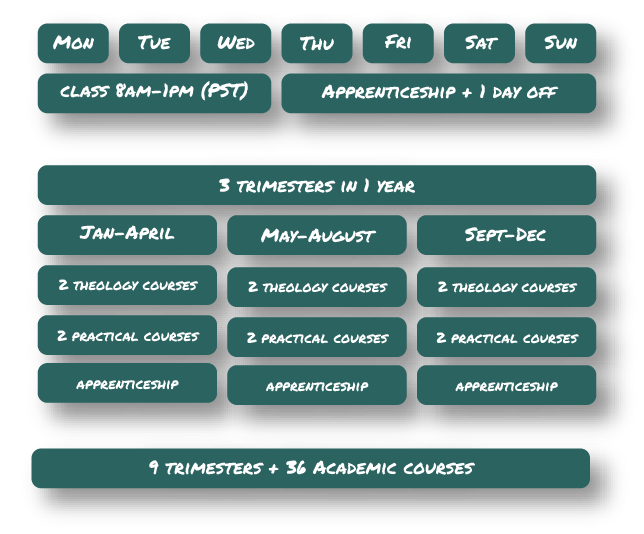Academics
How it works
With our dual-training system, we come to you to meet your needs. Here's what you need to know about how we operate:
- Live classes take place virtually from 8am-1pm (Pacific Standard Time) Monday-Wednesday via Google Meet, for 10 weeks during each trimester.
- The Apprenticeship takes 15 hours per week for 48 weeks per year for the duration of your studies.
- Trimesters are year-round, with about 4 weeks in between each.

TRIMESTER AT A GLANCE
2 theology courses:
- Church History I: Early Church Through Pre-Reformation Eras
- Greek: Introduction to New Testament Greek
2 practical courses:
- Self-Management: Self-Disciple and Prayer
- Evangelism and Marketing: Promotion for Church Work
Apprenticeship course:
- 1-3 areas of growth as part of our 3x3 track
- 1 self-paced course
- Individual and church projects


PRACTICAL COURSES:

Psychology
One of the primary pastoral tasks is to provide biblical counsel for congregation members. Foundational to this is a basic understanding of the various facets of modern Psychology. This course will provide an overview of the foundations of Psychology, both as a support for biblical counseling and as a demarcation of the boundary between biblical counseling and the field of Psychology.

Political Systems
This course offers an overview of the political systems of the United States. This includes significant events from the political history of the country, as well as current issues on the political landscape. Additionally, this course examines the unique position of Christians and also the Church in their place between political and societal institutions.

Gifts of the Spirit
The New Testament recognizes a multiplicity of gifts of the Spirit (charisms): character gifts such as mercy and martyrdom, practical gifts such as wise counsel and leadership, and more dramatic gifts such as prophecy and healing. This course will center on these latter gifts.
THEOLOGY COURSES:

Hebrew
Hebrew is the language of the Old Testament. Basic Hebrew skills are therefore important for in-depth theological training. In addition, this course will introduce the student to the Hebrew culture and way of thinking, in order to improve comprehension of the writings of the Hebrew Bible.

Sin & Justification
This course covers the traditional theological subjects of Hamartiology, the theological study of sin: its causes, significance, and consequences, and Soteriology, the theological study of salvation: the way, experience, and results of salvation through Jesus Christ.

World Religions
This course covers major religious traditions that have the largest number of worldwide adherents, such as Islam, Hinduism, and Buddhism. The focus of the course will include effective evangelism strategies for reaching members of these various religions.